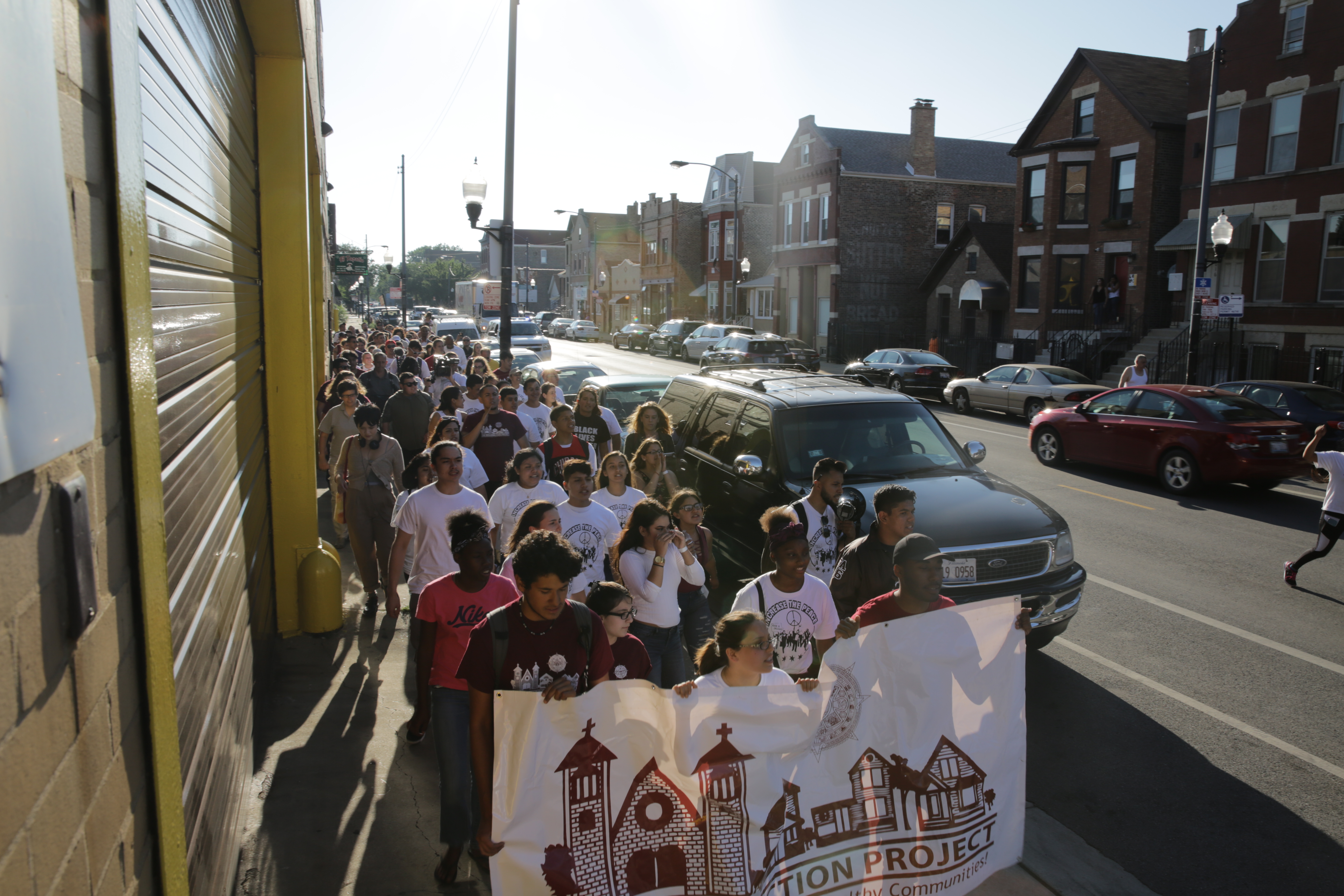Onlookers watched from their stoops and windows, phones in hand, as a sea of more than 75 young people marched in Pilsen along West 19th Street last Friday night. Twenty-two-year-old Elizeth Arguelles walked backwards as she led call-and-response chants, shouting into a microphone, “I can’t hear you! Whose street?”
“Our street,” the chorus of marchers replied in unison as they marched through the early evening before settling in for an all-night campout.
It's not an unfamiliar sight in Chicago, where peace marches are common in neighborhoods plagued by gun violence. But this initiative emphasizes one important factor: all their events are planned by youth leaders like Arguelles.
“Increase the Peace is a youth-led revolution across the city,” Arguelles says, describing the program run by Pilsen-based nonprofit the Resurrection Project, which trains young people ages 14 to 24 in civic action and leadership. “It’s a movement beyond a campout. We are trying to create safe spaces in our communities and a culture of non-violence.”
Friday evening’s Increase the Peace event is one of several taking place around the South and West Sides this summer, all led by the more than 50 young people who have been through the Resurrection Project's training. They coordinate with local leaders to plan a week of activities: canvassing the area, registering voters, and literally cleaning up the streets, all culminating in the final event.
The idea behind Increase the Peace was born following the shooting death of a 16-year-old girl in Back of the Yards last fall, says Berto Aguayo, 23, a Resurrection Project community organizer focused on safety and nonviolence. The shooting catalyzed a community discussion where one of the young people in the room suggested camping out all night in order to create safe spaces. “We often talk about youth violence without young people at the table, so this is what happens when you not only give young people a place at the table, but you have them lead the conversation," Aguayo says.

"We convinced ourselves that it wasn’t that crazy of an idea, and we just did it," he says. Weeks later the organization held a series of campouts in Back of the Yards, Pilsen, and Humboldt Park. Those events attracted more people to the initiative, which in turn led to additions like the voter registration component, which began this year.
Aguayo, a former gang member, credits the civics programs at Mikva Challenge for changing his life, and hopes Increase the Peace can do the same for others. “I often say the way I was able to transform my life is not the exception, it’s the norm. It’s what happens when you give young people an opportunity to do something positive," he says.
In addition to Increase the Peace, the Resurrection Project, which has been around since the 1990s, offers homeowner assistance, educational workshops, immigration services, and other civic engagement programs. Raul Raymundo, the nonprofit's CEO, says Increase the Peace is only one part of the equation to build healthy communities.
“Getting young people involved is one thing, getting them trained and developing leadership skills is a second thing, and that’s key," Raymundo says. “These young men and women are getting trained to be leaders, and are being challenged to get involved in their community to increase the peace, and eventually get more civically engaged in other matters.”
Pilsen native Hilario Dominguez, 24, an organizer with the Resurrection Project, agrees. One overarching goal for him is changing the narrative of their neighborhoods.
“We’re reclaiming the space that has a … negative image,” says Dominguez, a former Chicago Public Schools special education teacher. “[If gang violence] was a virus, we are coming in like an antibody … This is planting seeds, that hopefully someone else will come along and water, and people really start to see that this is what community looks like.”
The next campout is scheduled this Friday, August 4, at St. Michael’s Church (4825 S. Damen Ave.) in Back of the Yards. It will be followed by a Black and Brown Solidarity event the following Tuesday in Englewood.

Arguelles recalls arriving to her first campout at midnight with tamales in hand. She was immediately taken by the energy of like-minded people her age from communities affected by gun-violence.
“I remember Berto saying, ‘If I want to change the world, I have to change my country. In order to change my country, I have to change my state. In order to change my state, I have to change my city. In order to change my city, I have to change my village, and in order to change my village, I have to change myself.”
For Arguelles, the message was received.
“It really stood out to be because to create change, it starts with getting involved, it starts with getting in the fight. If I don’t fight for my community, who will?”



